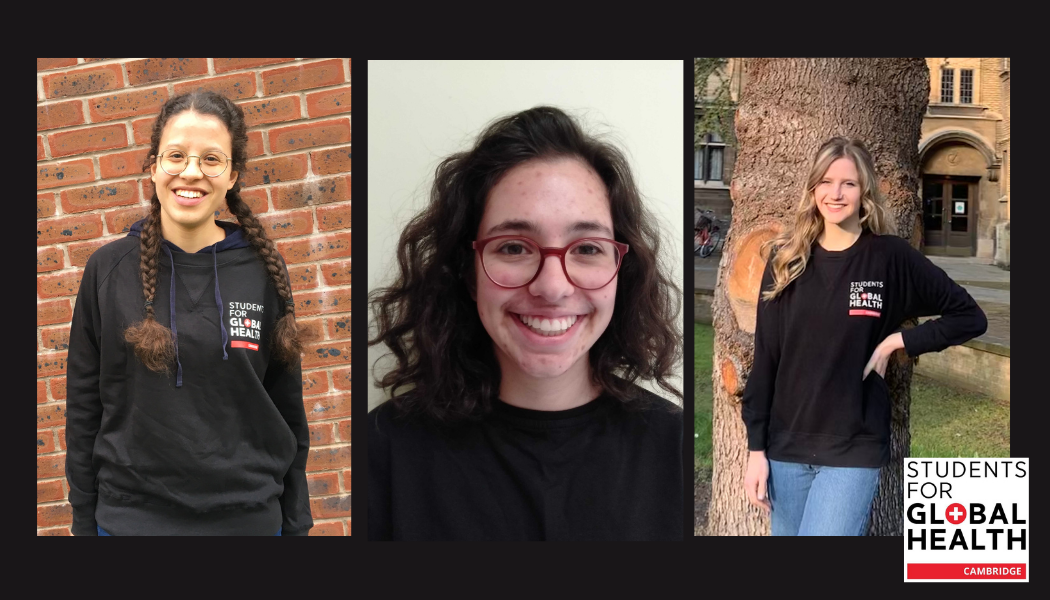PAR Foundation teams up with Students for Global Health Cambridge to deliver an AMR training programme
The training programme, named “Become an Antibiotic Ally Against AMR”, was developed by three students from Students for Global Health- Cambridge (SfGH): Anna Govett, Christine Agbenu and Anya Webber in collaboration with PAR Foundation.
– I was inspired to start this training programme for two reasons; the first is my serious concern about the severity of the issue of AMR both currently and in future trajectories, and the second is my belief in the power of students to evoke meaningful change through their hard work and passion for such social causes. I was already involved in SfGH and felt I wanted to use this network and structure to contribute to the fight against AMR in a multifaceted way, says Anna Govett, SfGH-Cambridge Training Officer.

SfGH Cambridge members who have developed the training programme: Christine Agbenu; Anya Webber; Anna Govett. Christine is a fourth-year medical student and the President of SfGH-Cambridge; Anna is a third-year student studying human, social and political sciences and is also the Training officer of SfGH-Cambridge. Anya is a fourth-year Natural Sciences student and the Poverty and Health subcommittee chair at SfGH-Cambridge.
SfGH-Cambridge is part of a wider network of students passionate about global health issues both nationally, as part of Students for Global Health UK and internationally, as part of the International Federation of Medical Students Association.
After publicising recruitment to the training programme an impressive 75 participants joined the scheme from a huge range of subject backgrounds and all year groups. Participants dedicated time outside their studies towards completion of the training programme over a 6-week period.
After some initial training on AMR and project management, participants were split into teams to work on specific projects, receiving tailored training to do this and support from supervisors. The project briefs were devised to support the work of the PAR Foundation. For example two of the teams are supporting the PAR foundation to create original content for their social media on Facebook and Instagram.
Carissa Li, a participant and the team leader for the Instagram team says :
– Joining the AMR training programme with PAR foundation has been a journey full of surprises. In addition to exploring the topic of antibiotic resistance, I’ve had the opportunity to meet a group of equally enthusiastic people and work as a team to contribute in bringing awareness to this issue. It was absolutely astonishing seeing how students, organisations and individual scientists that share the same passion for the topic collaborate. It is an overall very positive experience and I look forward to seeing PAR grow and evolve.
The teams have been working hard and will be presenting their work at an online conference on the 22nd March. Many of the students are also keen to continue their work beyond the duration of the training programme.
Anya Webber, Poverty and Health co-chair says:
–The teams have worked hard during the training programme to plan effective strategies to address AMR and as they’ve learned more about the importance of AMR and the current lack of understanding of it, I’ve seen them become even more passionate about addressing the issue. Many team members are also keen to continue their projects beyond the scope of the programme which is fantastic!
Both the PAR Foundation and SfGH-Cambridge hope that this pilot training programme will just be the start of a longer lasting collaboration.
Christine Agbenu, the President of SfGH-Cambridge says:
– We are really excited to see how much engagement there has been from students about this programme and we would really like for this training programme to launch our collaboration with the PAR Foundation. So that we can inspire and equip future generations of students with skills needed to engage their local communities, the online world and policy makers about the issues surrounding AMR. Hopefully we will be able to make a real difference in preventing antibiotic resistance!
“The teams have worked hard during the training programme to plan effective strategies to address AMR and as they’ve learned more about the importance of AMR and the current lack of understanding of it, I’ve seen them become even more passionate about addressing the issue.
Related articles
New collaboration between PAR Foundation and the Global AMR R&D Hub
– The collaboration with PAR Foundation is an excellent example for how the Dynamic Dashboard and the work of the Global AMR R&D Hub can support funders and stakeholders in the AMR R&D field more broadly, says Dr Elmar Nimmesgern, who leads the work of the Global AMR R&D Hub from their offices in Germany.
Opinion: Resistance could pose the greatest threat to our health
Debate article by The Foundation to Prevent Antibiotic Resistance, published in one of Sweden’s major daily newspapers Svenska Dagbladet 18 November 2020.
How should we measure our impact?
The Foundation to Prevent Antibiotic Resistance has joined the Swedish impact measurement network Effektfullt, a partner network of Social Value International. We will work together with other change-making organizations to develop effective ways to measure our impact.
